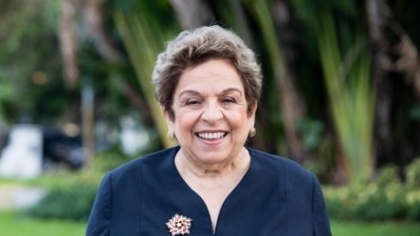Congresswoman Donna Shalala answered a range of questions, both personal and on her policymaking responsibilities, as part of the “Leading Change: Past, Present, and Future” webinar guided by Terri Scandura, the University of Miami Patti and Allan Herbert Business School’s Warren C. Johnson endowed chair professor of management.
University President Julio Frenk welcomed his predecessor and praised her “strong voice and very considerable substantive expertise on many issues that have a direct impact on our country, our community, and our University.”
Shalala said her “first real job after college”—as a 20-year-old Peace Corps volunteer in Iran—set the foundation for her long career in leadership, both in government and in academia.
WATCH THE FULL CONVERSATION:
“It made me a citizen of the world but also gave me confidence that you could drop me any place on earth and I could figure out how to get things done,” Shalala said. “Take a young American, drop them down in a mud-hut village in a very, very foreign country and give them a list of things to do. From that experience you learn a lot about poverty, about culture, and an enormous amount about yourself.”
She cited the challenges of generating legislation and working on the national board with oversight for the stimulus package when so much is still unknown about the virus.
“You’re flying blind without knowing a lot about how it’s transmitted, without having a treatment,” said Shalala. “So, what we have done is to repeat and repeat what you have to do which is very straight-forward, low-tech stuff—wash your hands, cover your face, social distancing, and staying at home.”
“And in terms of shaping legislation, we’ve had to first invest in the science to make sure that we were part of an international coalition—millions of dollars in the search for treatment and for a vaccine—and second we had to bolster the economy, particularly the working people. We have to get money into the pockets of people who lost their jobs,” she explained.
The longest acting secretary of Health and Human Services in U.S. history, Shalala said she “disagreed” with political leaders in Florida and elsewhere who have moved to reopen the economy before the measures public health experts have urged have been met.
WATCH MORE FROM MIAMI HERBERT: Miami Real Estate Experts Discuss The State Of The Market In Wake Of COVID-19
“I would not open up a business without testing everyone in that business,” she said. “If I was the leader, I would have starved this disease to the point at which our infections were going down for 14 days and then start the contact tracing and the isolation of people who test positive.
“We’re not doing this systematically. Red flags, yellow flags—that’s focused on opening up—that’s not a public heath strategy integrated with an employment strategy,” Shalala said. “The public health people have been clear about what we need to do, but we’re not doing it yet, and that’s in part because the federal government has abdicated its responsibility.”
She lauded the business sector for its ability to adapt and provide needed support for supplies and other facets in the fight to combat the impact of the coronavirus.
“The creativity of business has been amazing; Bacardi producing hand sanitizer, businesses retooling their manufacturing so they can produce masks or ventilators,” she remarked, but added that more could have been done if businesses had been asked.
Shalala recommended that future leaders calling for change must first know their subject matter and the culture of their organizations.
“You have to be a strategic thinker, it’s not just a matter of having a list of things that you want to do, and you have to understand the culture that you’re in,” she pointed out. She cited her experience running the Department of Health and Human Services where each of the different agencies—the National Health Institute, the Centers for Disease Control and Prevention, and the Food and Drug Administration—all had different cultures.
WATCH MORE FROM MIAMI HERBERT: How COVID-19 Will Change Higher Education
“It’s very much like a great research university where business schools and law schools and arts and sciences departments all have a different culture,” Shalala explained. “People think of ‘culture’ as ethnic, but it’s more than that.”
For students, Shalala said that it is likely that a national service corps will launch later this year and possibly by August that will offer service opportunities and the chance to pay off their educational loans.
And she had some insight for students graduating this year.
“Take a course in contact tracing,” she said. “There are going to be thousands of jobs. And if you wanted to enter business or the health care sector, it’ll give you a lot of interactions with people, teach you a set of skills, and is a wonderful way to start a career and help your country.”
In terms of leadership, Shalala encouraged students to develop expertise in a special field along with interpersonal skills.
“You have to learn empathy and learn leadership—I’ve learned a lot over the years—but more than anything else if you want to be a leader in our country or any country on earth, you’ve got to understand peoples’ lives,” she said. “You can’t make policy and you can’t be a leader unless you understand the lives of the people around you.”
The next edition of Miami Herbert's Virtual Distinguished Leaders Lecture Series will welcome Tash Elwyn, President and Chief Executive Officer, Raymond James & Associates, on Thursday, May 28 at 5:30 pm. For registration and more information, click here.
Miami Herbert Business School’s Virtual Distinguished Leaders Lecture Series is made possible through the generosity of Southern Glazer’s Wine & Spirits.

